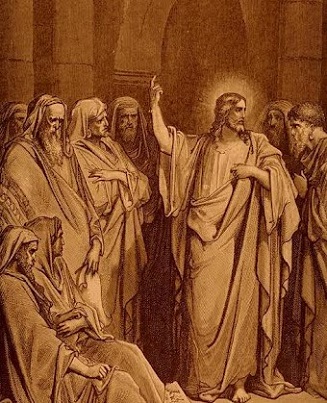2nd Sunday of Advent: The Missionary Spirit
by VP
Posted on Sunday December 10, 2023 at 12:00AM in Sermons

"Jesus, making answer, said to them: Go and relate to John what you have heard and seen."-St. Matt. xi. 4.
In the Gospel just read, my dear brethren, we are taught a very practical and important lesson. St. John the Baptist had been thrown into prison on account of his bold denunciation of the sins of those who were then in power. His disciples, it would seem, were losing confidence in him and in what he had taught them. His imprisonment was causing them to waver; and so St. John sends them to our Lord that they may learn from Him whether He was indeed what John had said He was, the promised Messias. "Art thou He who art to come, or look we for another?' '
Now, in what way did our Lord reply to this question? Did he enter into a long and elaborate argument in order to show from Moses and the Prophets that He fulfilled in Himself all that they had foretold? No, it was not by words that our Lord removed their doubts, although never man spake like Him. The way in which He brought the truth home to these men was by deeds. "Go relate to John what you have heard and seen; the blind see, the lame walk, the lepers are cleansed, the deaf hear, the dead rise again, the poor have the Gospel preached to them." It was the works which the Father gave Him to do which gave testimony of Him.
Now, the work of bringing back man to God, which brought our Lord down from heaven and of which he made the beginning, is continued and carried on, since He left this world, by His Church, which He founded for this purpose. By His life, and especially by His death and passion, He purchased for mankind full and complete redemption, inexhaustible grace in this life, and never-ending glory hereafter. To what our Lord did no addition can be made which is not itself due to the merits of our Lord's death and passion. The only thing which remains to be done is to have this grace applied to the souls of men. This application is to be made by the ministrations of the Church; in this way the realization and completion of our Lord's work are entrusted to her; and consequently, since our Lord went to heaven again, the Church is for men in the place of Christ, and has in her hands the ordinary means by which men make their own what our Lord has done for them. It is in the Church that our Lord dwells, it is through the Church He works, it is by her ministration that men, according to the ordinary course of God's providence, are saved.
If this be so, we must all see how important it is that nothing should be done by Catholics to keep men from the Church, and that everything should be done to bring them within her fold. The Church has a work to do for every man in this vast city of ours. And how is she to perform this work? How is the fact, that she comes from God, to be brought home to each and all? In early days miracles were the most cogent proof of her supernatural origin. But although miracles are still wrought in the Church, they are not among the ordinary ways by which we can prove to those outside that the Church comes from God. Argument, historical investigation, logic, are good ways of doing this. But men are too busy to study profoundly in our times. There is another way, however, and a better one; one more powerful, one which appeals to larger numbers, one without which all the ways are very often unsuccessful, and that is that Catholics should prove themselves to be before the eyes of men what the Church teaches them to be; that by their works, which they are seen to perform, they should make manifest to all that they are in possession of the truth of God.
Can we say, my dear brethren, that this is the case? Let us not be afraid to look at the facts as they really are. Are our lives such as to recommend to those outside that faith in and through which all must be saved? Let each one ask himself this question; and reflect what a terrible thing it will be hereafter if he has so acted as to have shut out from eternal life a single soul which might have been saved had he acted rightly."
Five-minute Sermons for Low Masses on All Sundays of the Year, Volume 1 by the Priests of the Congregation of St. Paul 1893
